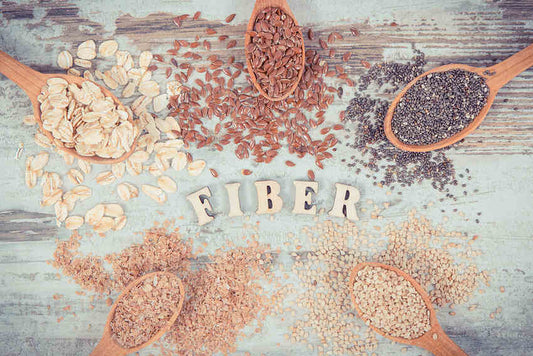When it comes to talking about gut health, it’s a vast topic - and we could go on about it forever. But while we’re not going to dive into the nitty-gritty details of supporting a healthy gut, one factor most people don’t realize plays a significant role in gut health: fiber.
Yep - that fibrous stuff that’s loaded into cereals to help you, you know, poop. We talk about fiber a lot in relation to bowel health and regularity, but it also plays a significant role further up the GI tract in the gut.
Fiber may not be the sexiest subject to discuss, but it does more than keep your digestive system chugging along. Prebiotic fiber is one of the best things you can give your gut to support the function and maintenance of your gut microbiome - the complex, microscopic community of billions of microorganisms in your digestive tract.
Here’s the scoop on what you need to know about fiber - specifically, inulin and psyllium - and gut health.
What Is Gut Health?
Are you mega-stressed? Not sleeping well? Eating poorly? Not exercising? Chances are your gut isn’t in the healthiest state it could be in… Signs of poor gut health are sometimes hard to recognize, but when it needs a little R&R, your body has ways of letting you know.
Sometimes it’s obvious - gas, bloating, diarrhea, and sometimes it’s not - anxiety, eczema, fatigue. But what exactly is the gut, and why is it important?
Most people think about the stomach when they hear the gut, but technically speaking, your gut is synonymous with your gastrointestinal tract, encompassing the entire digestive tract from your mouth to your anus.
But more specifically, we can also talk about the gut as the stomach and intestinal tract. Whichever way you slice it, the gut is important - it influences everything from digestion and immune function to mood and cognition.
Inside the gut, we have the gut microbiome - a community of trillions of bacteria, fungi, viruses, and other microbes that live in our bodies and influence our physiology, both in health and disease 1.
These microbes contribute to metabolic functions, protect the body against pathogens, regulate the immune system, and, through these critical functions, directly and indirectly, impact most of our physiologic functions in some capacity.
Gut microbes are essential for host digestion and nutrition, but they can also produce nutrients from substrates that are otherwise indigestible by the host. In most cases, there’s a mutually beneficial relationship between gut microbiota and health status.
Additionally, gut microbes also produce short-chain fatty acids (SCFAs) from indigestible fibers that are a vital energy source for intestinal mucosa and are paramount for modulating immune responses 1.
So, while the gut is anything but simple, it’s safe to say that the millions of microbes residing in our bodies play a significant role, and maintaining a healthy gut is key to maintaining health and preventing disease. Let’s look a little deeper at why gut health is so important.
Why Is Gut Health Important?
A healthy gut means healthy digestion, but it also means a lot more - a healthy immune response, good brain function, stable moods, a healthy heart, good bowel movements, and much more.
Although there’s still an abundance of research to do on the gut and human health, several studies over the past couple of decades have found several links between gut health and: 2
- Immune function
- Mood disorders
- Cognition and mental health
- Autoimmune disease
- Endocrine diseases
- Cardiovascular disease
- Cancer
- Gastrointestinal disorders
Maintaining good gut health is all well and good, but even minor lifestyle disruptions can cause the balance in the gut to go sideways, which allows harmful bacteria to proliferate and thrive, disrupting the delicate balance.
As a result, you’re left with a state of imbalance, also known as dysbiosis. At first glance, an imbalance may not seem too problematic, but it is in the grand scheme of things.
A healthy gut microbiome is characterized by the ecosystem’s diversity, stability and resistance, and resilience. Once the ideal microbial balance is shifted in favor of harmful bacteria, dysbiosis will persist until the balance is re-established - and this isn’t always an easy task.
In normal, healthy conditions with a healthy microbiome, there’s tremendous crosstalk and cross-regulation between the host (you) and the microbes that reside in your gut. This is to ensure balance and health and prevent pathogenic bacteria from proliferating.
Essentially, there’s a symbiotic relationship whereby bacteria thrive in the gut’s rich environment, and the host benefits from numerous functions the bacteria offers 3.
Dysbiosis is such an important discussion point because a microbial imbalance in the gut breeds disease - and it’s not just with digestion. Because gut health reaches beyond just the GI tract, poor gut health has been implicated in several diseases 3:
- Inflammatory bowel diseases (Crohn’s, ulcerative colitis)
- Obesity
- Allergies
- Type 1 diabetes mellitus
- Autism
- Autoimmune diseases
- Cancer
With all that said, is there any question about why a healthy gut is essential?
But here’s the thing - getting into a state of dysbiosis is a lot easier than getting out. Good gut health takes a conscious effort, and diet is one of the best starting places.
Fiber And Gut Health: Why Do You Need It?
Although getting an array of nutrients and avoiding bad foods - processed sugars, refined carbohydrates, alcohol, processed meats, etc - is the foundation of a gut-friendly diet, we want to draw your attention to one big piece of the puzzle: fiber.
Fiber, whether soluble or insoluble, is critical to bowel health. It feeds the healthy bacteria in the colon and keeps us regular. We all know we need it, but most don’t get enough of it.
Before we talk about the two biggest types of fiber, let’s look at why it’s important to support gut health:
- Feeds the good bacteria in the gut: The healthy bacteria in your gut feed on fiber; the unhealthy bacteria feed on sugar. If you want the right gut bugs to proliferate and thrive, you need to feed them! In particular, the good gut bugs love prebiotic fiber. These are specific microbiota-shaping compounds that serve as a carbon source for the growth of the beneficial microbes in the gut 4. Essentially, prebiotics help nourish specific bacterial strains populating the gut rather than contribute additional strains.
- Supports the production of beneficial compounds: When good gut bugs eat prebiotic fiber, they produce beneficial compounds called short-chain fatty acids that may be linked to several health benefits, such as better immune system function and less inflammation 5. Some research also finds that SCFAs can signal your gut to shift its environment favorably to support the growth of healthy bacteria 6.
- Protects the integrity of the gut lining: Your gastrointestinal tract is like the gatekeeper that keeps good bacteria in and harmful bacteria out. Your gut bugs have a role in maintaining the integrity of the intestinal lining, and fiber nourishes these bacteria so they can do their job. It also stimulates mucus production, strengthening your gut’s protective barrier 7.
But of all the fibers to choose from, how do you know what’s best? Two types of fiber you hear a lot about are inulin and psyllium - what’s better?
Inulin and Psyllium
Inulin and psyllium are both non-starch polysaccharides, meaning they have ten or more monomeric units; others include cellulose, hemicellulose, acacia gum, and guar gum 8.
They are natural, plant-based starches that offer similar benefits, such as regulating blood sugar, treating constipation, and reducing cholesterol and triglyceride levels. But they also have their unique benefits.
Inulin is a fructooligosaccharide that provides fuel for the beneficial bacteria in the gut - it’s a type of prebiotic bacteria naturally found in many foods like bananas, asparagus, soybeans, leeks, and onions.
Inulin is a fermented, non-viscous fiber that does not have water-holding capacity and therefore doesn’t provide the laxative benefit that other fibers do 9.
Several studies confirm that consuming an inulin-rich diet can also improve the gut environment by supporting the health of certain bacterial species.
One study found that just two weeks of consuming vegetables rich in inulin results in a 3.8-fold increase in the Bifidobacterium genus 10.
Psyllium, on the other hand, is derived from Plantago ispaghula and P. ovata plants and is typically consumed for their high fiber and mucilage content, which bulks up the stool and offers laxative effects, but also soothes the GI tract, reduces cholesterol, and helps regulate blood sugar.
In contrast to inulin, psyllium is not fermented in the gut and retains its water-holding capacity through the large intestine 9. As a result, it pulls water in and helps move the stool through the colon.
Because psyllium holds its gel structure, it normalizes the stool by softening bulky stools and making them easier to pass, increasing transit time, and improving bowel movement frequency.
The Verdict: What’s Better For Gut Health?
There are ample sources of dietary fiber to support good gut health, but between psyllium and inulin, who wins?
Psyllium is the way to go if you’re looking for bowel health and regularity. It’s a great bulking agent that helps to soften stools and move them through the colon, but it doesn’t have the greatest effect on gut bacteria.
Inulin, however, is a prebiotic that serves as a direct energy source of bacteria in the gut and helps to support the proliferation of certain beneficial strains.
So, if you want a healthier gut, load up on inulin-rich foods and invest in a supplement that works. Performance Lab Prebiotic is the perfect match for a fiber-rich diet. It’s a 2-in-1 probiotic + soluble fiber stack featuring Orafti® Synergy1 Inulin-FOS fiber for healthy metabolic and microbiome support.

Rather than adding new colonies into your gut, nourishes your existing probiotic for robust growth and health to deliver more reliable, natural, and comfortable microbiome support. Plus, fiber supports digestion, immune function, fat loss, and more.
References
- Shreiner AB, Kao JY, Young VB. The gut microbiome in health and in disease. Curr Opin Gastroenterol. 2015;31(1):69-75.
- Hills RD Jr, Pontefract BA, Mishcon HR, Black CA, Sutton SC, Theberge CR. Gut Microbiome: Profound Implications for Diet and Disease. 2019;11(7):1613.
- DeGruttola AK, Low D, Mizoguchi A, Mizoguchi E. Current Understanding of Dysbiosis in Disease in Human and Animal Models. Inflamm Bowel Dis. 2016;22(5):1137-1150.
- Carlson JL, Erickson JM, Lloyd BB, Slavin JL. Health Effects and Sources of Prebiotic Dietary Fiber. Curr Dev Nutr. 2018;2(3):nzy005.
- Silva YP, Bernardi A, Frozza RL. The Role of Short-Chain Fatty Acids From Gut Microbiota in Gut-Brain Communication. Front Endocrinol (Lausanne). 2020;11:25.
- Byndloss MX, Olsan EE, Rivera-Chávez F, et al. Microbiota-activated PPAR-γ signaling inhibits dysbiotic Enterobacteriaceae expansion. 2017;357(6351):570-575.
- Desai MS, Seekatz AM, Koropatkin NM, et al. A Dietary Fiber-Deprived Gut Microbiota Degrades the Colonic Mucus Barrier and Enhances Pathogen Susceptibility. 2016;167(5):1339-1353.e21.
- Cronin P, Joyce SA, O’Toole PW, O’Connor EM. Dietary Fibre Modulates the Gut Microbiota. 2021;13(5):1655.
- McRorie JW Jr. Evidence-Based Approach to Fiber Supplements and Clinically Meaningful Health Benefits, Part 2: What to Look for and How to Recommend an Effective Fiber Therapy. Nutr Today. 2015;50(2):90-97.
- Hiel S, Bindels LB, Pachikian BD, et al. Effects of a diet based on inulin-rich vegetables on gut health and nutritional behavior in healthy humans. Am J Clin Nutr. 2019;109(6):1683-1695.















